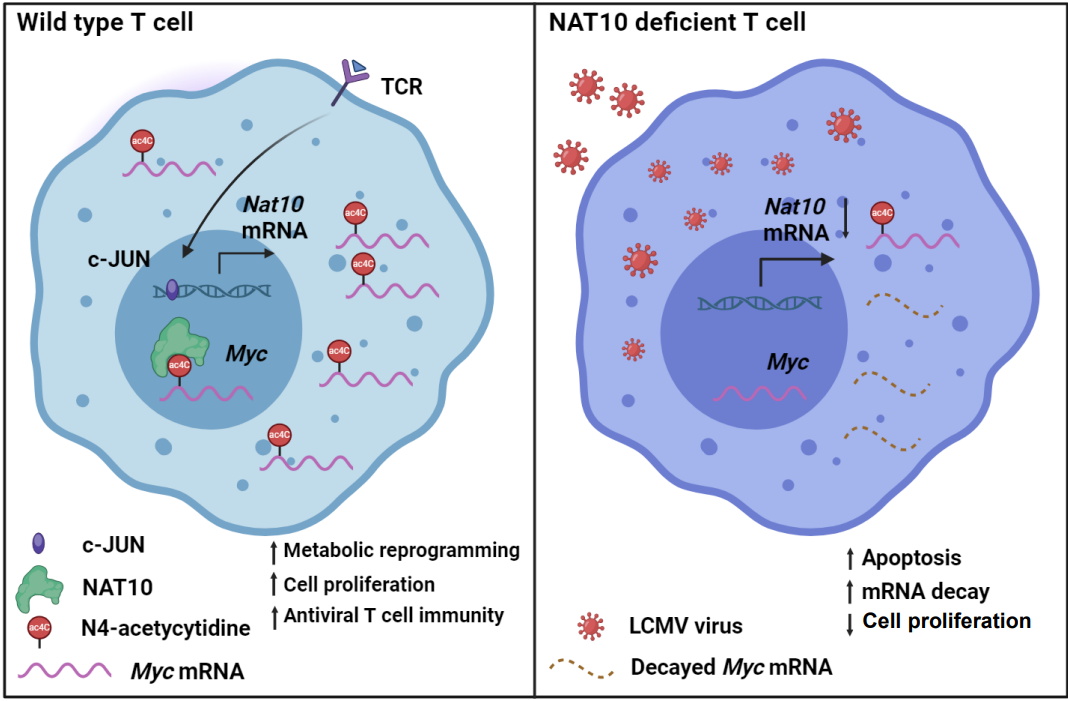Duojiao Wu's Team Reveals a Novel Mechanism of ac⁴C Modification in Regulating T Cell Expansion and Antiviral Immunity
Source:Duojiao Wu
2025-04-21
T cells serve as pivotal components of the human immune system. Upon stimulation by antigens, these cells can rapidly activate and undergo robust clonal expansion, thereby playing crucial roles in the elimination of pathogens, virus-infected cells, and tumor cells. Recent researches have highlighted RNA modifications as significant epigenetic regulators of T cell development, differentiation, and function. However, the specific role of N4-acetylcytidine (ac⁴C) modification in T cells has yet to be investigated.
On March 5, 2025, Dr. Duojiao Wu’s team at Fudan University published a research article entitled "A critical role of N4-acetylation of cytidine in mRNA by NAT10 in T cell expansion and antiviral immunity" in Nature Immunology. This study demonstrates that ac⁴C modification of mRNA catalyzed by the RNA acetyltransferase N-acetyltransferase 10 (NAT10) promotes the proliferation and antiviral immunity of T cells by stabilizing Myc mRNA. These findings provide novel mechanistic insights into the role of RNA modifications in immune regulation.
Initially, the researchers observed a significant upregulation of both NAT10 expression and ac⁴C levels during T cell activation. Subsequently, they developed T cell-specific NAT10 knockout mice (CKO mice), which exhibited substantially reduced cell numbers, impaired proliferation, and increased apoptosis in peripheral T cells. Mechanistically, the absence of NAT10 resulted in decreased ac⁴C modification on Myc mRNA, accelerating degradation of these transcripts, which finally caused impaired metabolism, damaged expansion potency and cell cycle arrest. Furthermore, CKO mice exhibited significantly impaired antiviral T cell responses in the Lymphocytic choriomeningitis virus,LCMV)model, thereby confirming the indispensable role of the NAT10/MYC axis in T cell-mediated antiviral immunity.
Moreover, based on their previous findings, the researchers noted an age-associated decline in NAT10 expression within T cells. In aged individuals, T cells exhibited decreased NAT10 and MYC protein levels, which largely accounted for the limited proliferative potency and weakened antiviral responses. Notably, restoring MYC expression significantly rescued the proliferative capacity and antiviral function of T cells from the aged, suggesting a potential therapeutic avenue for enhancing immune responses in the elderly.

This study systematically elucidates the critical role of NAT10-mediated ac⁴C RNA modification in T cell expansion and antiviral defense. It uncovers a novel layer of RNA modification–based regulation of T cell function and highlights potential therapeutic strategies for boosting immunity in aged populations.
Lu Sun (Zhongshan Hospital, Fudan University), Xiaoyan Li (Xinhua Hospital, Shanghai Jiao Tong University School of Medicine), and Feixiang Xu (Zhongshan Hospital, Fudan University) are co-first authors of the paper. Dr. Duojiao Wu (Zhongshan & Jinshan Hospitals, Fudan University) is the corresponding author. Zhouli Cheng (Jinshan Hospital, Fudan University), Zhenju Song (Zhongshan & Jinshan Hospitals, Fudan University), and Yan Lu (Shanghai Sixth People’s Hospital) are co-corresponding authors. The study was supported by the National Natural Science Foundation of China, the National Key Research and Development Program of China, the Science and Technology Commission of Shanghai Municipality, and Zhongshan Hospital, Fudan University.
Original article: https://www.nature.com/articles/s41590-025-02100-2
On March 5, 2025, Dr. Duojiao Wu’s team at Fudan University published a research article entitled "A critical role of N4-acetylation of cytidine in mRNA by NAT10 in T cell expansion and antiviral immunity" in Nature Immunology. This study demonstrates that ac⁴C modification of mRNA catalyzed by the RNA acetyltransferase N-acetyltransferase 10 (NAT10) promotes the proliferation and antiviral immunity of T cells by stabilizing Myc mRNA. These findings provide novel mechanistic insights into the role of RNA modifications in immune regulation.
Initially, the researchers observed a significant upregulation of both NAT10 expression and ac⁴C levels during T cell activation. Subsequently, they developed T cell-specific NAT10 knockout mice (CKO mice), which exhibited substantially reduced cell numbers, impaired proliferation, and increased apoptosis in peripheral T cells. Mechanistically, the absence of NAT10 resulted in decreased ac⁴C modification on Myc mRNA, accelerating degradation of these transcripts, which finally caused impaired metabolism, damaged expansion potency and cell cycle arrest. Furthermore, CKO mice exhibited significantly impaired antiviral T cell responses in the Lymphocytic choriomeningitis virus,LCMV)model, thereby confirming the indispensable role of the NAT10/MYC axis in T cell-mediated antiviral immunity.
Moreover, based on their previous findings, the researchers noted an age-associated decline in NAT10 expression within T cells. In aged individuals, T cells exhibited decreased NAT10 and MYC protein levels, which largely accounted for the limited proliferative potency and weakened antiviral responses. Notably, restoring MYC expression significantly rescued the proliferative capacity and antiviral function of T cells from the aged, suggesting a potential therapeutic avenue for enhancing immune responses in the elderly.

This study systematically elucidates the critical role of NAT10-mediated ac⁴C RNA modification in T cell expansion and antiviral defense. It uncovers a novel layer of RNA modification–based regulation of T cell function and highlights potential therapeutic strategies for boosting immunity in aged populations.
Lu Sun (Zhongshan Hospital, Fudan University), Xiaoyan Li (Xinhua Hospital, Shanghai Jiao Tong University School of Medicine), and Feixiang Xu (Zhongshan Hospital, Fudan University) are co-first authors of the paper. Dr. Duojiao Wu (Zhongshan & Jinshan Hospitals, Fudan University) is the corresponding author. Zhouli Cheng (Jinshan Hospital, Fudan University), Zhenju Song (Zhongshan & Jinshan Hospitals, Fudan University), and Yan Lu (Shanghai Sixth People’s Hospital) are co-corresponding authors. The study was supported by the National Natural Science Foundation of China, the National Key Research and Development Program of China, the Science and Technology Commission of Shanghai Municipality, and Zhongshan Hospital, Fudan University.
Original article: https://www.nature.com/articles/s41590-025-02100-2


